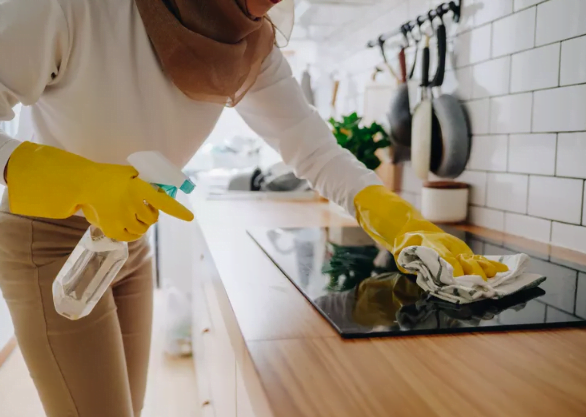Smelling a burning plastic smell when there’s no obvious source of the odor is concerning, and it’s something that should be addressed as soon as possible.
If you are facing a burning plastic smell in your house, here are a few possible sources to consider, what you should do about it and, once you’ve cleared any harmful causes, how you can get rid of the smell and its possibly dangerous fumes.

Where Does a Burning Plastic Smell Come From?
A burning plastic smell can come from actual burnt plastic, such as a plastic food storage container that fell to the bottom of a dishwasher, a plastic cooking utensil that melted onto a hot burner, or a plastic hair accessory that ended up in close contact with a straightening iron. If your burning plastic smell is coming from one of these sources, you’ll have an answer right away. You’ll still have to deal with getting rid of the odor, but at least it’s a straightforward fix.
Unfortunately, a burning plastic smell isn’t always that simple to locate. One of the most concerning causes of a burning plastic smell is faulty electrical wiring. Bad electrical wiring can overheat or even catch fire, and that can lead to burning parts including insulation, connectors, and more. These pieces are most likely hiding out of sight, making it difficult to figure out where the smell is coming from.
HVAC systems and furnaces are another likely culprit, especially in the case of an overheated part due to a system that hasn’t been regularly cleaned or an air filter that’s become clogged. Similarly, nearly all appliances can emit a burning plastic smell if they overheat due to clogs or dust.
And, if you overload your wall outlets in your electrical system, you can also cause it to overheat, which can melt the various plastic components in a wall socket.
What Should You Do About a Burning Plastic Smell?
Because the burning plastic smell could be coming from an electrical system that’s malfunctioning or overloaded wall outlets, it’s important to act swiftly to prevent a fire from starting or spreading. Quickly determine where you believe the smell is coming from. If there is a specific appliance or area associated with the smell, turn off and unplug all associated appliances. You should even turn the power off to the area at the breaker to ensure there is no electricity continuing to run to the area.
If you cannot determine where the burning plastic smell is coming from, then it’s best to call in a professional. Call 911 if the smell is persistent or you begin to see smoke or even flames.
If you do not believe there is an immediate fire risk, but the smell is a continued nuisance, call an electrician, preferably one that does emergency calls. You’ll want to get them to your home as soon as possible to determine the cause and make sure there is not a risk. If there is an issue with an overheating HVAC system or appliances, the electrician can also make that determination. At that point, you can decide whether a professional fix or cleaning is necessary or whether you can clean filters and dust yourself.
How Can You Get Rid of a Burning Plastic Smell?
A burning plastic smell is bothersome because of its acrid, chemical nature, but it can also be toxic if it’s coming from actual burning plastic.1 Because these fumes can be more than a sensory issue, it’s important to get rid of them as quickly as possible.
First, remove the item that is causing the burning plastic smell, if possible. If it was caused by a clogged filter, remove that filter. Open all of the windows to help air out your home, turn on any fans, and bring in an air purifier.
Then, try to remove the smell from your home by placing bowls of white vinegar throughout the affected rooms. This should help purify the air and absorb the odor. Additionally, fill a bucket with dishwashing liquid and water, and, using a sponge, wipe down counters, cabinets, furniture, floors, appliances, and any other surfaces in the impacted spaces








